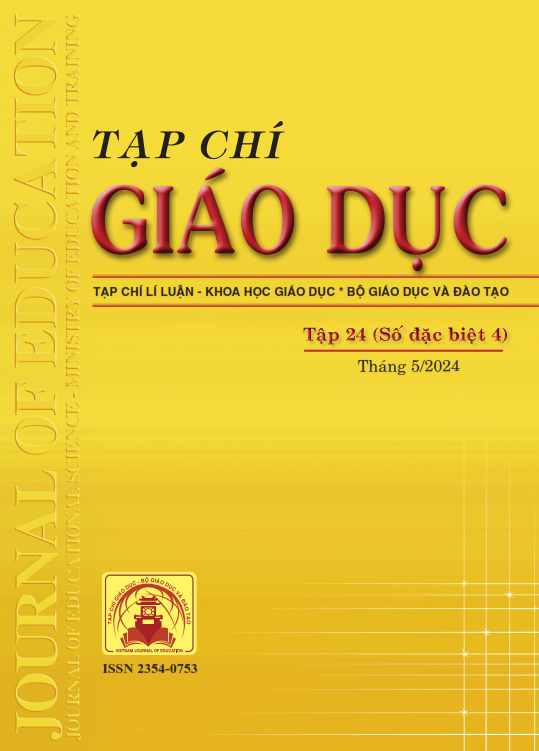Kịch bản dạy học sử dụng Chatbot kết hợp trò chơi hoá trong dạy học môn Toán lớp 3 theo hướng học tập tự điều chỉnh
Tóm tắt
With the continuous development of technology and especially artificial intelligence, Chatbot is becoming a useful tool in the field of education, helping to bring students friendly, interesting learning experiences and support teachers effectively. The article presents some theoretical issues about using Chatbots as well as gamification in teaching and self-regulated learning methods. From there, we propose a teaching scenario according to three phases of self-regulated learning: Forethought phase, Performance phase and Self-reflection phase. This scenario helps students perform their learning tasks under the guidance of a Chatbot virtual teacher and a real teacher. The combination of Chatbot with gamification brings many benefits to the teaching process. Not only that, teaching according to the Cyclical phases of self-regulated learning creates a flexible, personalized learning environment, suitable for each student with different learning styles, interests and abilities. From there, it gradually forms learners who are autonomous, independent, active and develop necessary social skills.
Tài liệu tham khảo
Abbasi, S., & Kazi, H. (2014). Measuring effectiveness of learning chatbot systems on student’s learning outcome and memory retention. Asian Journal of Applied Science and Engineering, 3(2), 251-260.
Akcora, D. E., Belli, A., Berardi, M., Casola, S., Di Blas, N., Falletta, S., ... & Vannella, F. (2018). Conversational support for education. In Artificial Intelligence in Education: 19th International Conference, AIED 2018, London, UK, June 27-30, 2018, Proceedings, Part II 19 (pp. 14-19). Springer International Publishing.
Alvi, E., & Gillies, R. M. (2020). Teachers and the teaching of SRL (SRL): The emergence of an integrative, ecological model of SRL-in-context. Education Sciences, 10(4), 98.
Barata, G., Gama, S., Jorge, J. & Goncalves, D. (2013). Engaging engineering students with gamification. 5th International Conference on Games and Virtual Worlds for Serious Applications (VS-GAMES), 11-13 sept. pp. 1-8.
Cunningham-Nelson, S., Boles, W., Trouton, L., & Margerison, E. (2019). A review of chatbots in education: practical steps forward. In 30th annual conference for the Australian Association for engineering education (AAEE 2019): educators becoming agents of change: innovate, integrate, motivate (pp. 299-306). Engineers Australia.
Fonte, F. A. M., Nistal, M. L., Nistal, M. L., & Rodríguez, M. C. (2016, April). NLAST: A natural language assistant for students. In 2016 IEEE global engineering education conference (EDUCON) (pp. 709-713). IEEE.
Goehle, G. (2013). Gamification and web-based homework. Primus, 23(3), 234-246.
Kapp, K. M. (2012). Games, gamification, and the quest for learner engagement. T+ D, 66(6), 64-68.
Nah, F. F. H., Zeng, Q., Telaprolu, V. R., Ayyappa, A. P., & Eschenbrenner, B. (2014). Gamification of education: a review of literature. In HCI in Business: First International Conference, HCIB 2014, Held as Part of HCI International 2014, Heraklion, Crete, Greece, June 22-27, 2014. Proceedings 1 (pp. 401-409). Springer International Publishing.
Nam, N. T. H., & Giang, N. T. H.(2023). Design of Knowledge Flow According to the Approach of Self-Regulation Learning for Teaching Maths on Chatbot. International Journal of Current Science Research and Review, 8039-8052. https://doi.org/10.47191/ijcsrr/V6-i12-59
Panadero, E. (2017). A review of Self-regulated Learning: Six models and four directions for research. Frontiers in Psychology, 422.
Pintrich, P. R. (2000). The role of goal orientation in Self-regulated Learning. In Handbook of self-regulation (pp. 451-502). Academic Press.
Riel, J. (2020). Essential features and critical issues with educational chatbots: toward personalized learning via digital agents. In: M. Khosrow-Pour (Ed.), Handbook of research on modern educational technologies, applications, and management (pp. 246-262). IGI Global. 10.1142/S0218194019400163.
Roberts, E. D., Tadlock, J., & Zumbrunn, S. (2011). Encouraging Self-regulated Learning in the classroom: A review of the literature. Metropolitan Educational Research Consortium.
Sreelakshmi, A., Abhinaya, S., Nair, A., & Nirmala, S. J. (2019). A question answering and quiz generation chatbot for education. In 2019 grace hopper celebration India (GHCI). IEEE, pp. 1-6.
Vázquez-Cano, E., Mengual-Andrés, S., & López-Meneses, E. (2021). Chatbot to improve learning punctuation in Spanish and to enhance open and flexible learning environments. International Journal of Educational Technology in Higher Education, 18(1), 1-20.
Zimmerman, B. J. (2002). Becoming a self-regulated learner: An overview. Theory into Practice, 41(2), 64-70.
Đã Xuất bản
Cách trích dẫn
Số
Chuyên mục
Giấy phép

Tác phẩm này được cấp phép theo Ghi nhận tác giả của Creative Commons Giấy phép quốc tế 4.0 .












